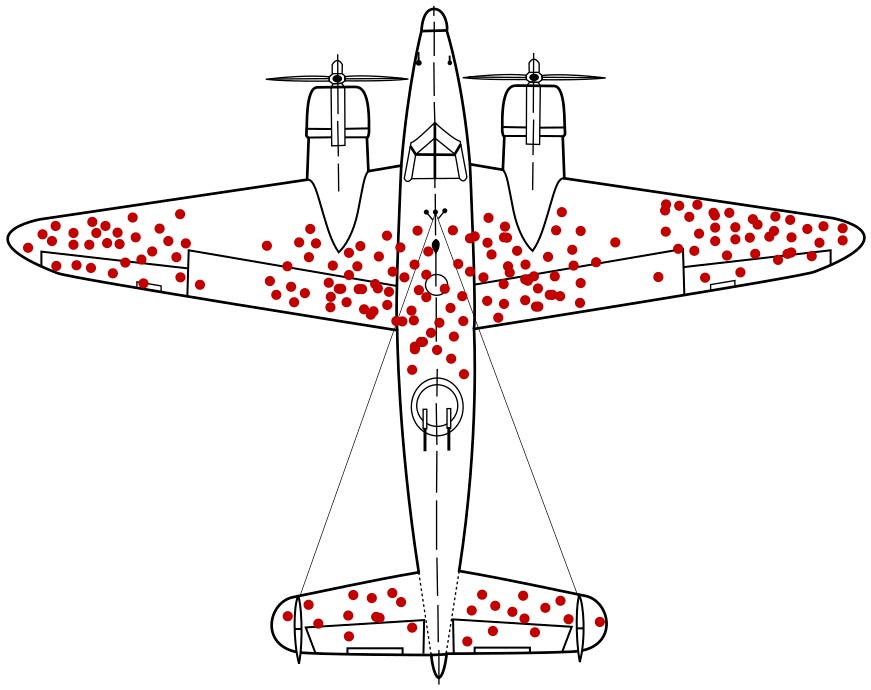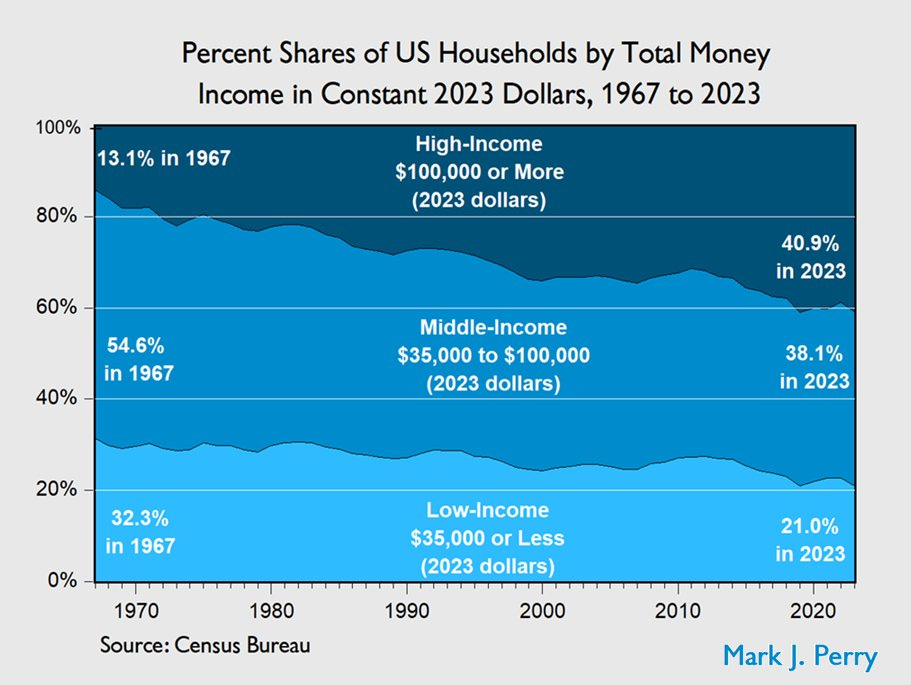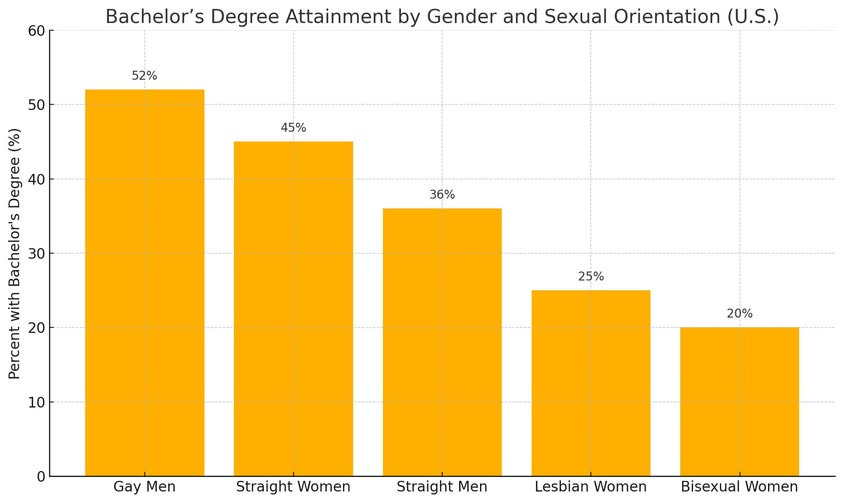Survivorship Bias, the Myth of the Shrinking Middle Class, and What Men Will Do to Avoid Baldness
The Nature-Nurture-Nietzsche Linkfest for July 2025

In Case You Missed It…
Professors Behaving Badly: How Self-Interest and Bad Incentives Corrupted the Ivory Tower
12 Things Everyone Should Know About the Psychology of Victimhood
Welcome to the July edition of the N3 Newsletter Linkfest: a roundup of the most surprising, provocative, and underappreciated research and ideas I’ve come across in the last month.
In today’s offering, we’ll look at political bias in university reading lists, the link between having pet cats and schizophrenia, how people can will themselves to live longer to dodge estate taxes, and how humans have literally shifted the Earth’s poles.
We’ll also ask: Who’s more educated, straight people or gay people? Which words are known better by men than by women, and vice versa? And how much money would men cough up to avoid going bald? (Note that the last item includes a photo of me in my long-haired rocker days.)
You can access the complete collection of Linkfests here.
The Case of the Missing Bullet Holes
Let’s kick things off with my all-time favorite example of survivorship bias. During World War II, the US military wanted to add extra armor to its bombers based on data showing where returning planes were hit most often. People usually assume that the best bet would be to reinforce those areas. But a statistician named Abraham Wald had a better idea: Reinforce the areas where the planes weren’t hit. Wald realized that the bullet holes on returning aircraft showed where a plane could take damage and still survive. The unscathed areas, in contrast, were those where, if hit, the planes never made it home. [Link.]

This hypothetical pattern of damage of surviving aircraft shows locations where they can sustain damage and still return home. If the aircraft was reinforced in the indicated areas, this would be a result of survivorship bias because crucial data from fatally damaged planes was being ignored; those hit in other places did not survive. Source: Wikipedia.
The Myth of the Cooperative Collectivist
We tend to assume that people in collectivist societies are more cooperative and less competitive than those in individualist ones. But the evidence suggests the reverse: that collectivists are actually more competitive - not just with outsiders, but also within their own groups. Why, then, do they have a reputation for cooperation and harmony? According to a fascinating recent paper, it’s because collectivists tend to compete in subtler, less overt ways than individualists. The idea is captured nicely in the paper’s title: Hide a Dagger Behind a Smile. [Link.] HT Christine Leong
The Myth of the Shrinking Middle Class
Technically, it’s not a myth; the middle class really is shrinking. What is a myth, though, is the widespread assumption that this is because people are getting poorer. It’s the opposite: It’s because people are getting richer. And yes, the graph is adjusted for inflation. [Link.]

Source: Perry (2025).
Political Bias in University Reading Lists
A new working paper explores university reading lists related to three hot-button issues: abortion, the Israeli-Palestinian conflict, and racial bias in the criminal-justice system. It finds a consistent skew toward progressive positions across Western universities. Lead author Jon Shields notes that the findings made him rethink his long-held assumptions about the extent of political bias in academia (see the quote below). [Link.]
Jon A. Shields: In past years, when I’ve had conversations with colleagues about the politicization of the university, particularly when I’m talking to people far to my right, I tend to defend the university and tell them, “Things aren’t really nearly as bad as you think.” But I feel like I’ve got to revisit my prior assumptions. It does seem, at least in the case of certain controversies, that college teaching is much more one-sided than I would have predicted…
Trump, mercifully — he will go away one day. But the growing distrust in the university won’t. That’s going to be with us for a long time, unless we do something about it. My one rock-solid prediction is that public trust is not going to rebound if we keep doing what we’re doing. We have to recommit ourselves, it seems to me, to teaching these scholarly disagreements. Otherwise, we’re not going to recover.
IQ and Online Activism
A new study finds that intelligence is negatively correlated with online political activism: The smarter people are, the less involved in online activism they tend to be. [Link.]
Relationship Science
What makes men physically attractive? Recent research suggests that body fat percentage is a better predictor than BMI or shoulder-to-waist ratio. The most attractive male bodies have a body fat percentage of 13-14%. This makes good evolutionary sense, as this range is closely linked to metabolic health. [Link.]
People’s reasons for seeking a romantic relationship are a good predictor of whether they’ll find one. Those who genuinely desire a connection have a better chance of partnering up than those driven by insecurity or social pressure. [Link.]
Sexual Orientation and Educational Attainment
Everyone knows that men now earn fewer degrees than women. But here’s an interesting twist: Gay men earn more degrees than any other demographic (including straight women), whereas lesbians and bisexual women earn fewer degrees than any other demographic (including straight men). As the researcher who discovered this pattern, Joel Mittleman, observed, “if America’s gay men… formed their own country, it would be the world’s most highly educated by far.” [Link.]
Three Fascinating Sex Differences
The graph below shows which words are known better by women than men, and which by men than women. I’ve removed the key showing which color represents which sex, because I’m pretty sure you won’t need it… [Link.]


